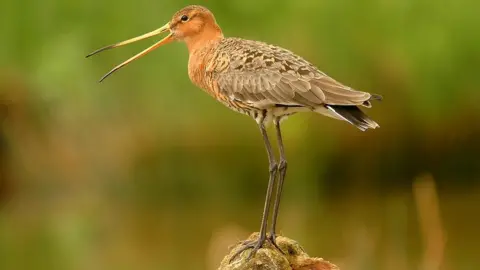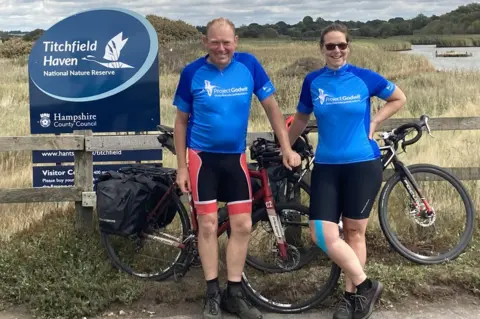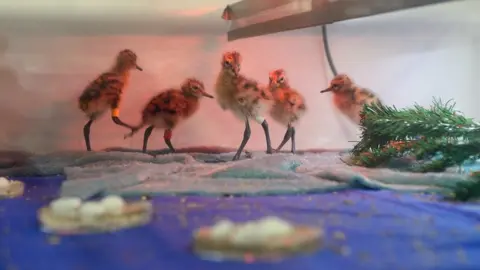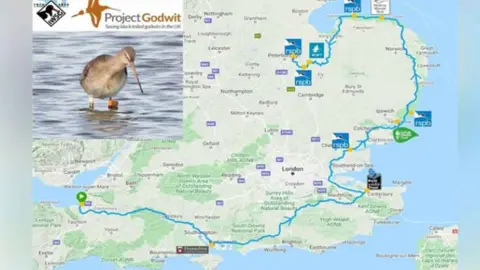Coronavirus: Cyclists raise money for godwit bird project hit by lockdown
 RSPB
RSPBTwo cyclists are riding 600 miles in eight days to raise funds for a wading bird conservation project hit by coronavirus lockdown restrictions.
With about 50 breeding pairs in the UK, Project Godwit raises black-tailed godwits in captivity to boost numbers.
Dr Jennifer Smart and her husband are cycling from Somerset to Cambridgeshire to support the scheme, which usually moves birds around the UK.
The pair said the "epic" trip aimed to "boost funds and raise awareness".
 Jennifer Smart
Jennifer SmartThe population, once thought to be about 100 pairs, had been hit mainly by "flooding and predation", said Dr Smart, a conservation scientist.
Project Godwit, a partnership between the Royal Society for the Protection of Birds (RSPB) and the Wildfowl and Wetlands Trust (WWT), collects eggs from the wild, incubates and hatches them in captivity until the birds are released at fledging age to "carefully chosen sites".
This has not been possible this year due to lockdown restrictions limiting people's movements or ability to visit nature reserves to monitor the birds' progress.

 Wildfowl and Wetlands Trust
Wildfowl and Wetlands TrustBlack-tailed godwit
- A large wading bird with a bright orangey-brown chest and belly in summer, but more greyish-brown in winter
- Breeds on a select few wet meadows and marshes
- Migrates to west Africa for winter, while birds from Iceland spend winter in the UK
- It is thought that the lowest number the breeding population got to in recent years was 35 pairs, but it is now slowly rising
Source: RSPB and Dr Jennifer Smart

Dr Smart said: "By taking the eggs and hatching them in captivity we are removing them from the biggest risks at their most vulnerable time.
"We are also fast-tracking colonisation at new sites, because spreading them out also reduces the risk."
 Project Godwit
Project GodwitThe Smarts, from Cantley in Norfolk, both work for the RSPB and are cyclists but they have never attempted a long-distance multi-day ride.
They hope to raise £5,000 for Project Godwit and the International Wader Study Group.
They left WWT Steart Marshes in Somerset on 23 August and their route links 11 nature reserves used by godwits released by the project.
They are due to arrive at the RSPB's Nene Washes in Cambridgeshire on Sunday.
Dr Smart said the "support on the way round has been phenomenal".
"It's been really fantastic to meet all the people, the birdwatchers who have been monitoring for us," she said.

Find BBC News: East of England on Facebook, Instagram and Twitter. If you have a story suggestion email [email protected]
